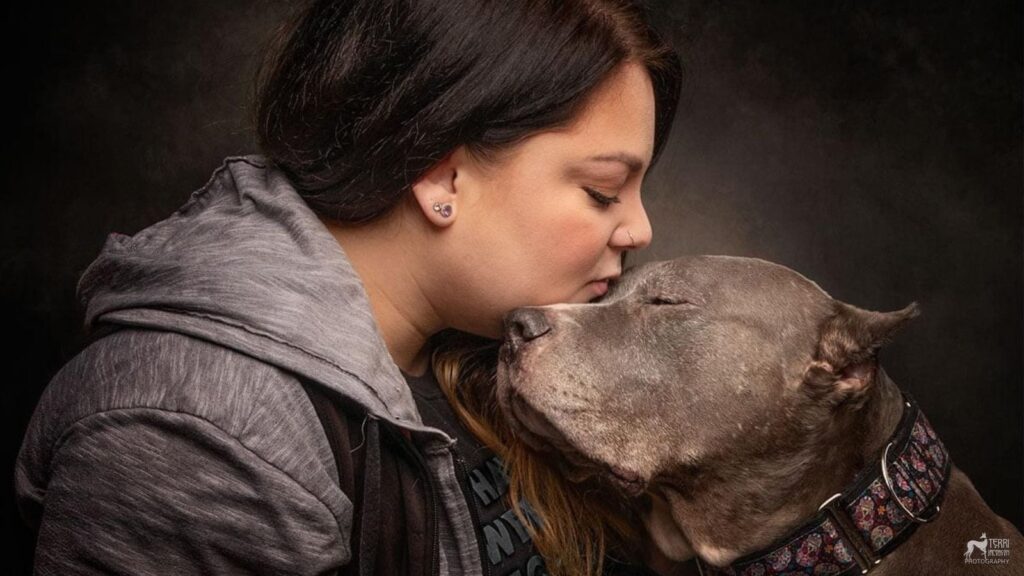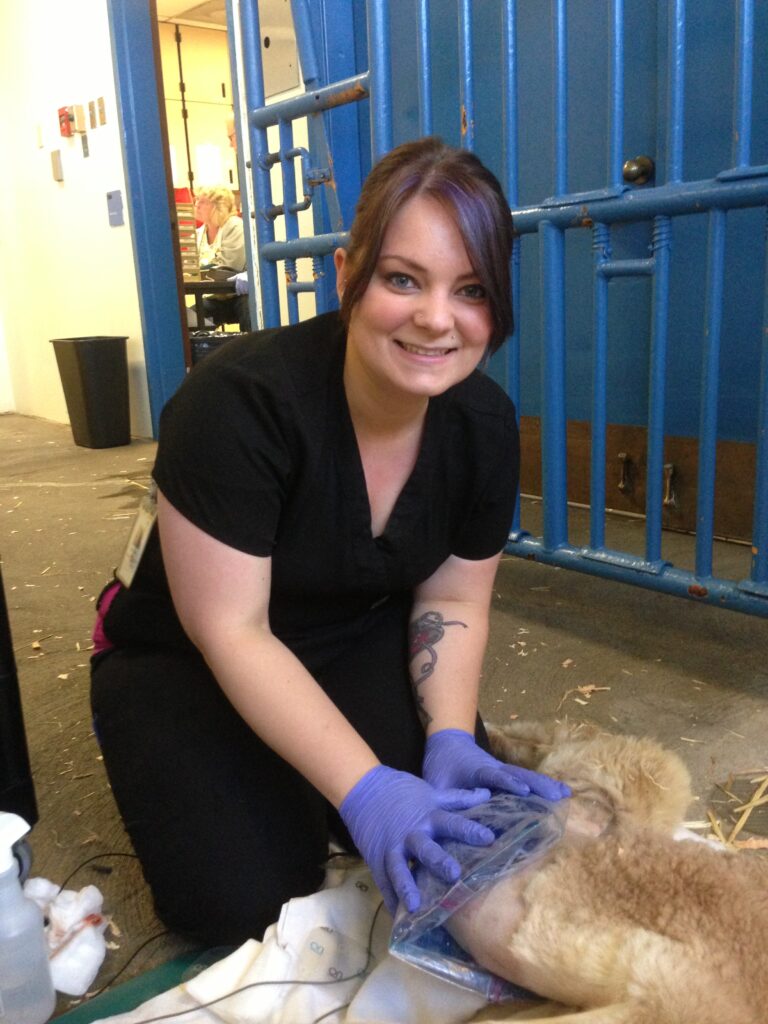BSIHS student Sarah Ostrin furthers her mission to combine human and animal healing.

Sarah Ostrin enrolled in the Bachelor of Science in Integrative Health Sciences (BSIHS) program at the National University of Natural Medicine (NUNM) in 2023, determined to finish her undergraduate degree and explore a new career path.
Nearly two decades earlier, Ostrin had attended Oregon State University (OSU) to study animal sciences. However, a sudden family loss caused her to put academia on hold and shift directly into professional life and her role as a veterinary technician.
In the years that followed, she worked at OSU’s College of Veterinary Medicine’s small animal rehabilitation program, co-founded the Salem Oregon Animal Rehabilitation facility for pet recovery services, and became the first technician to serve as president of the American Association of Rehabilitation Veterinarians.
It wasn’t until the coronavirus pandemic that Ostrin took a step back to assess her progress and realized that something was missing.
“We had to leave clients in their cars and just interact with their pets without letting them be together,” she said. “That just killed me because I’ve always been a people person, despite loving animals.”
Over the years, Ostrin had considered advancing in her field but knew she didn’t want to become a veterinarian. Still, she felt it was time to take a new direction.
“I had this moment where I was questioning if vet med was really where I wanted to be and if I did want to be here, did I want to stay where I’m at?” she said. “I just had this bug in me that said it wasn’t enough—I just wasn’t happy.”

During a six-month hiatus from her work, she took time to reflect on her next move.
“I started to wonder what it would look like if I got my ND and still kept my tech license,” Ostrin said. “Then, maybe I could treat people and their pets all together.”
She describes the moment she found NUNM as “serendipitous”, as if it were the perfect opportunity to dive deeper into integrative healthcare.
As she nears graduation from the BSIHS program, she is working on a capstone project that explores work-life balance and burnout rates in the veterinary field and says her vision for the future has become clear.
Ostrin recently attended an NUNM Exploration Day event and chose to continue her education through the Doctor of Acupuncture with a Chinese Herbal Medicine Specialization (DAcCHM) program.
She said the choice felt like a natural extension of her work in veterinary care, where holistic treatments are already widely practiced.
“We’re doing physical exercise, nutrition, supplementation—I’ve even done platelet-rich plasma and stem cell injections,” Ostrin said. “These are more accessible and affordable for people, so it’s what I’m used to.”
Sarah Ostrin discussed her mid-career transition with NUNM and explained how the Bachelor of Science in Integrative Health Sciences (BSIHS) program opened new doors for a career in holistic health.
NUNM: How did you decide to advance your degree after the BSIHS program?
Ostrin: After going to Classical Chinese Medicine Exploration Day at NUNM, I decided to apply for the DAcCHM program (and was accepted!) I felt this route would give me more practical and applicable skills because of my background and passion for working with animals, while still fulfilling my goal to leverage the human-animal bond and encourage healthy living for the whole family.
Also, I just left the International Veterinary Pain Management Forum where I discussed with numerous colleagues the lack of research on animals—particularly with fascial work such as cupping or Kinesio Taping®. Most acupuncture research is referred from humans, so I’d love to be able to do actual studies with our pets that look at sporting or working dogs for injury recovery and prevention, or even disease modification on our geriatric or hospice patients.
What drives your mission to merge human and animal health?
I really enjoy interacting with animals and their owners, but the surgical side of things has never been my thing. I wondered how I could do more of what I loved, have the autonomy I wanted, and still make a living—without doing the things I didn’t like. There are a few veterinarians out there who use alternative treatments, but I don’t think there’s anyone who combines all of it into one.
When I worked at OSU’s Carlson College of Veterinary Medicine, we trained family pets to be service dogs for kids with cerebral palsy, creating treatment plans to improve mobility for both the kids and their dogs. It was such a rewarding experience, and it really made me think about how I could do something similar in the future.
As a society, we need to learn and improve how we live together. Nowadays, so many people consider their pets to be part of their family, or like children. Research shows how animals can help do things like improve mental health (e.g., cats purring on your chest can lower your blood pressure). I want to be able to discuss nutrition, mobility, pain, and behavior and how they’re interconnected with each other. My background gives me a unique perspective, and I hope my current skills (and soon-to-be-acquired knowledge) will be helpful to many.
How did your experience in veterinary medicine shape your perspective of the BSIHS program?
In the veterinary clinic, it’s often an emotional emergency, not just a medical one. Since animal life isn’t valued as highly as human life, we have to make choices based on what’s culturally and financially feasible, as well as what’s reasonable given the circumstances.
I really appreciate that the BSIHS program teaches us to stop and look at everything from someone else’s perspective, not just our own. It’s something I learned in veterinary medicine and continued learning here. The program pushes you to think beyond your usual perspective and consider the world as a whole and emphasize a holistic approach—not just in integrative medicine, but also within community, life, and individual well-being.
Before this, I wasn’t sure if I had found my place, but now I know I don’t have to be pigeonholed in just one area of work or follow a specific path that doesn’t resonate with me. This showed me that there’s room for my approach, and it’s possible to do things differently. I’m really excited about what comes next. I love learning and exploring, so I’m looking forward to seeing where this all leads.
Written by Ashley Villarreal, Marketing Content Specialist